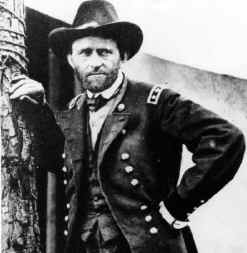Jeff Jacoby writes of an interesting chapter in Jewish American History and a tale of atonement in Grant’s Greatest Regret in Townhall, 12/5/12.
Excerpts:
In December 1862, with the Civil War raging, the Union Army’s efforts to control the movement of Southern cotton was bedeviled by illegal speculation and black marketeers. Like many of his contemporaries, Major General Ulysses S. Grant – then commanding a vast geographic swath called the Department of the Tennessee – shared a crude stereotype of all Jews as avaricious, corner-cutting swindlers. That ugly prejudice boiled over in General Orders No. 11, the most infamous anti-Semitic injunction in American history: “The Jews, as a class violating every regulation of trade established by the Treasury Department and also department orders, are hereby expelled from this department within 24 hours from the receipt of this order.”
The region commanded by Grant was home to several thousand Jews (including men in uniform serving under him). Fortunately, General Orders No. 11 had little direct impact on most of them. Jews were driven out of Paducah, Ky., and some towns in Mississippi and Tennessee, and there were accounts of Jewish travelers being imprisoned and roughed up. But a breakdown in military communications slowed the spread of Grant’s directive, and at least some officers had qualms about enforcing it. Brigadier General Jeremiah C. Sullivan, the Union commander of Jackson, Tenn., commented tartly that “he thought he was an officer of the Army and not of a church.”
What stopped the expulsion order cold, however, was the commander-in-chief. When word of Grant’s edict reached President Lincoln on January 3, 1863, he immediately countermanded it. “To condemn a class is, to say the least, to wrong the good with the bad,” the president declared. “I do not like to hear a class or nationality condemned on account of a few sinners.”
But it was as president that the full extent of Grant’s regret became clear. He opposed a movement to make the United States an explicitly Christian state through a constitutional amendment designating Jesus as “Ruler among the nations.” He named more Jews to government office than any of his predecessors – including to positions, such as governor of the Washington Territory, previously considered too lofty for a Jewish nominee.
Grant became the first American president to openly speak out against the persecution of Jews abroad. In response to anti-Jewish pogroms in Romania, he took the unprecedented step of sending a Jewish consul-general to Bucharest to “work for the benefit of the people who are laboring under severe oppression.” All in all, the eight years of Grant’s presidency proved to be a “golden age” in US Jewish history. When he died in 1885, he was mourned in synagogues nationwide.
It was a remarkable saga of atonement. From scourge of the Jews to their great friend in Washington; from the general who trampled Jewish liberty to the president who made protection of their rights a priority. Only in America.


Recent Comments